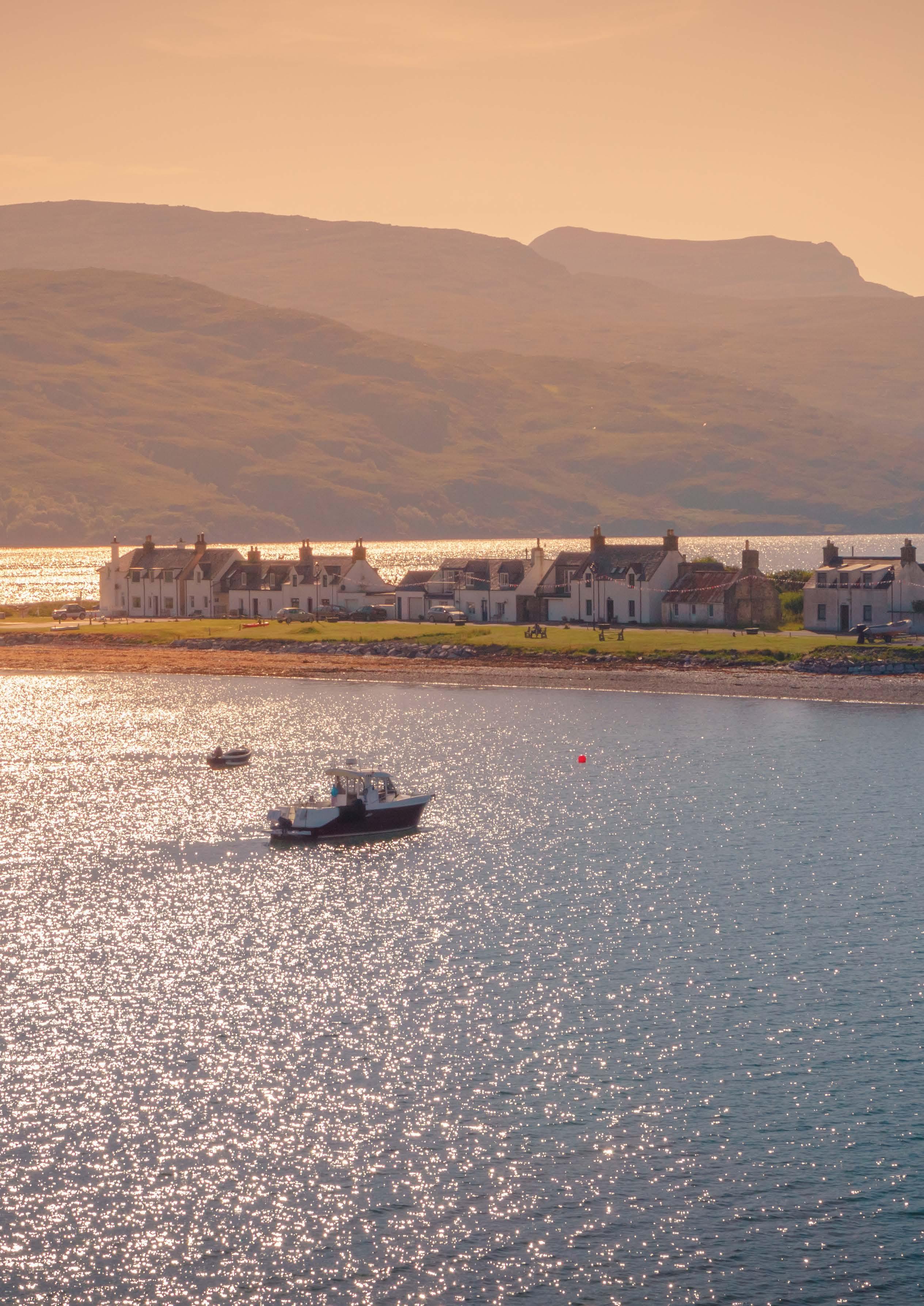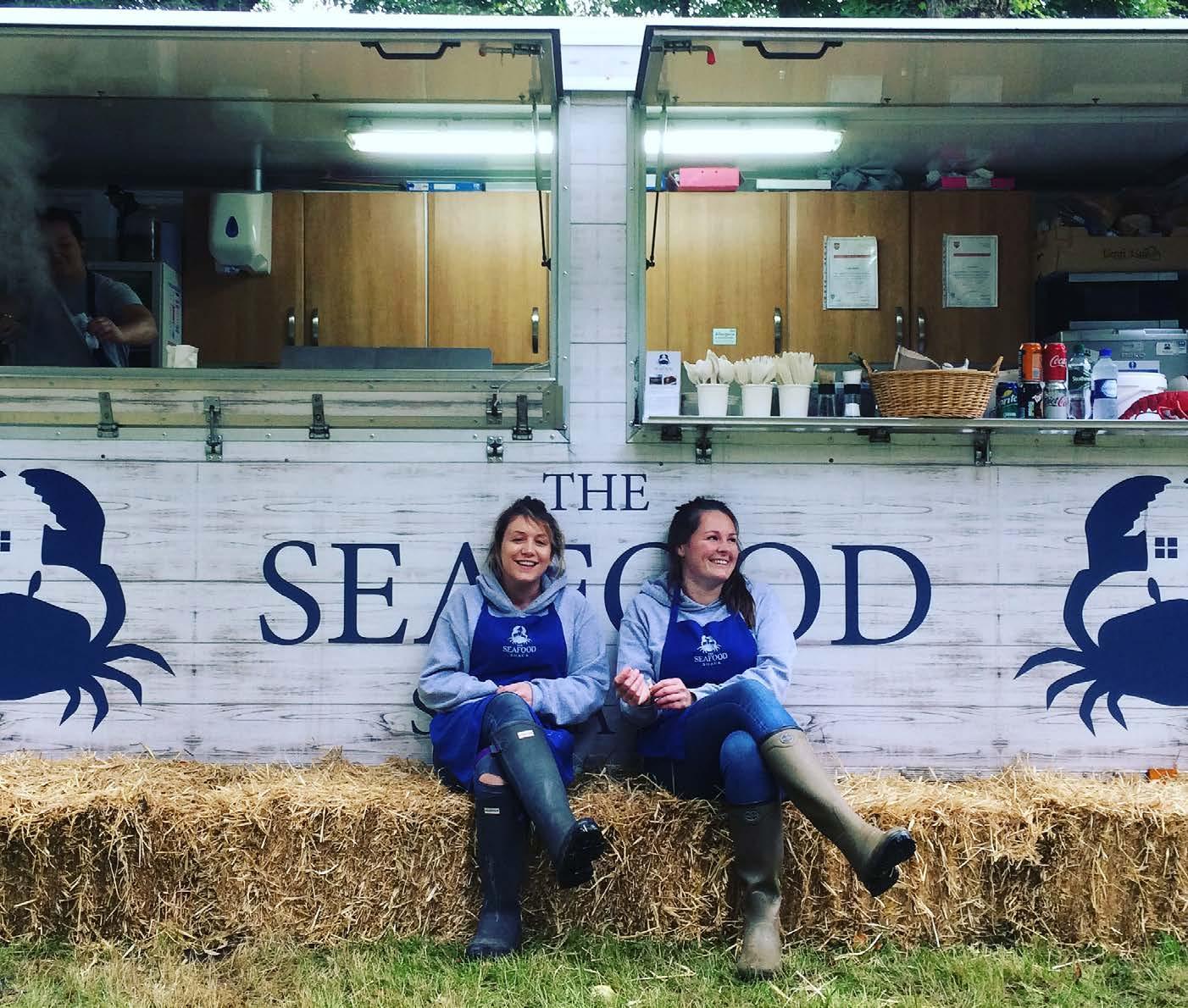
11 minute read
Finding reasons to stay local
Ullapool’s history has centred on fish
and sea trade. In this 360-degree view of today’s village, our conversations reveal how capitalising on opportunities coupled with a strong, can-do community provides inspiration and a rich future for its younger generation.
Ullapool High School in Northwest Scotland has the largest catchment area in western Europe. If you were one of the pupils attending the school, especially one of those with a daily 60-mile round trip, you might be forgiven for harbouring pessimistic thoughts about continuing to live in a rural area when schooldays are over.
And you would not be alone. Indeed, assuming a continuation of recent trends, The James Hutton Institute projects that the population of Scotland’s sparsely populated areas - over 40% of the country by area – will decline by over 18% between 2018 to 2043. For the working age population, the estimation is a higher rate of decline – their predictions total over a quarter

Meanwhile, in England, recent government figures suggest that the rural population fell from 17.2% to 17% of England’s total population between 2011 and 2018 while the average age of rural dwellers increased further. The peak age group in rural areas in 2018 was 50-54, while that in urban areas was 25-29 years’ of age. This phenomenon is observable across Europe.
However, the coastal village of Ullapool demonstrates that, encouraged by the local community, young people’s attitudes to remaining or leaving are by no means cut-and-dried - there are attractive, local alternatives to heading for the city in search of higher education, employment and a future.
Ullapool is a village of around 1,500 inhabitants in the northwest highlands perched on the edge of the beautiful Loch Broom. Originally founded on fishing, it draws visitors from around the world and its economy is now fuelled by tourism. But fishing remains an important part of life there.
SEAFOOD SHACK
Kirsty Scobie and Fenella Renwick are two young people who did remain in Ullapool and started their own business, the highly successful Seafood Shack. They cook - to order - simple, quick, and fresh seafood caught by their friends from the village. The daily menu changes with the catch and regularly includes line-caught haddock, hand-dived scallops, and creel-caught lobster. Their signature dish is a tasty haddock wrap.
Kirsty and Fenella both grew up in and around Ullapool and wanted to build their futures there. They were determined to create a business that would enable them to live as they wanted in Ullapool balancing hard work with time and space to play. Determined to bring something different to the village, they were both in their 20s when they launched their catering trailer in 2016 with very little money behind them.
“We spotted a gap in the market as, despite so many inshore fishing boats landing in Ullapool harbour all year round, a high percentage of this produce was leaving the village. We wanted locals and visitors to experience it,” says Fenella.
With just the two of them cooking and serving food all through the long summer months, their business is completely shaped around the place and community in which they live. “We started out wanting to do something a bit different,” says Kirsty. “We didn’t want to step on any toes at the existing businesses here, but we did want to stick with what Ullapool does best, and that’s seafood. As a village that was founded on fishing and with our partners both involved in fishing – it felt fairly obvious.”
In just six years they have established a successful food business, won countless awards and have published their own recipe book.
“It’s the young people who are starting these things up – it’s up to us,” says Fenella.
“When we first started the shack there weren’t many young people coming back but there really are now and I feel like that is because people like ourselves or the guys who started the paddleboarding centre – we’re all young. I think it does feed other people because you think ‘well my mates up there doing this, I could go and do it’. I think that is a huge part of getting to young people,” she adds.
YOUNG INSPIRES YOUNG
The example that Kirsty and Fenella have set is certainly having an influence
“Every time you see a local-run business, like the Seafood Shack, doing well, you get a little buzz of pride at how people are using the rich seas and flow of tourists to create something super successful,” says 16-yearold Meg Loftus, local student, sailor and member of Ullapool Sea Savers. “There’s an enormous sense of community within the village.”

- Meg Loftus, Ullapool (age 16)
Meg, whose father is a boat builder in Ullapool, has a positive experience of rural life. “Living in the country makes you sort of old and young at the same time, I go sailing without my parents for days at a time, kids in my class own parts of farms and even know how to deliver a lamb,” she says.
“By far the best thing about Ullapool is how I can leave school at 3:45 and by 4:00 be slipping off the mooring and heading out to sea.
“It’s hard to explain why I love it so much, but it feels like home, I can’t walk through Tesco’s without seeing about five of my classmates and probably one of my teachers. Trying to drag Dad through without him chatting to someone for half an hour is tricky,” she says. “We grumble and roll our eyes at the tourists gawking and taking photos on the seafront but knowing that your home is so beautiful that people stop and stare always brings a little hum of contentment.”
Despite the idyllic setting and a lifestyle that many city dwellers dream of, particularly so following the Covid 19 pandemic, there are downsides to rural life in such an isolated location.
“The thing a lot of young people in Ullapool really struggle with is travel,” says Meg. “Some of my school friends are spending up to three hours on a bus each day, and that’s not the wild countryside freedom that people imagine when they move out of the city.”
She adds that the bus services can be erratic, particularly at weekends, and expensive. And she says that the infrastructure, particularly roads, is lacking. “While tourism brings in most of the money to power the local economy, the endless stream of campervans clogs our tiny roads and adds to travel times.” She points out that it is not the fault of the tourists but that identifying roads which they can and cannot use would help.
Internet access is also an issue, particularly for younger people. “In Ullapool, most Wi-Fi services are fine, but in the more remote valleys it can be patchy and slow,” Meg states. “Kids need to be able to pursue their passions, whether that’s gaming and other Wi-Fi-based pastimes, or enjoying the beautiful countryside.”
IT STARTS AT SCHOOL
Such experiences can influence young people’s decisions about the future and deter them from remaining in the area which is a concern for Ullapool High School head teacher Robbie McFedries.
One of Robbie’s key concerns is how many young people migrate from Ullapool to urban areas, not only because it is a loss to the Ullapool community, but also because conversations with young people suggest leaving is often not what they want.
“When we speak to students - in common with much of the Highlands - we find that there's a tremendous push, they feel that pressure to leave. But a lot of them say that they don’t want to leave, they’d prefer to stay, but they want housing and transport opportunities that don't currently exist here.”
So, providing an awareness of the career opportunities that exist in the area helps to provide the counter argument to moving away.
“We want to give our students the opportunity to go and experience things in the world, but we want them to come back! We want them to have opportunities, choices, and chances in their local community, because it's a great community, it's a really special place.
“It doesn't serve young people well, to think that [university/leaving is] the only route. So, we work with many [others] in a partnership called Developing the Young Workforce.”
The partnership works to identify local employers to help with apprenticeships and to set up strong links with the colleges in Ullapool (West Highland College, part of the
Tread ISSUE 2
- Robbie McFedries, Ullapool High School.
University of the Highlands and Islands) and Inverness.
“I want youngsters to be unafraid to have the experience of going to college in a bigger city and if they experience it now, they’ll be better able to make that decision.”
As part of this mission to broaden horizons, Robbie and his colleagues also work closely with LANTRA - the leading award body for land-based industries - to deliver outdoor courses on things such as crofting and countryside skills. The school also partners the John Muir Trust to involve young people in activities such as the peatland projects, support them to get qualifications, such as Junior Ranger qualifications and the Explorer award, as well as working to improve the school’s environmental credentials.
LOCAL WORK EXPERIENCE
The school has linked up with local gamekeepers to provide work experience in countryside management. A local fish farm provides experience in aquaculture and is developing a fully sponsored apprenticeship program. And Ullapool Harbour Trust is developing a fabrication facility in the village where apprenticeships in engineering can take place in the future.
An advantage of Ullapool being such a small school - there are just 250 students between the ages of 12 and 18 - is that it is more able to involve students in decisions about course provision and to uniquely tailor courses to enable students to access subjects that they are interested in. And average year-group size of 40 enables flexibility, for example, if six students want to study say sound production, or marine biology, it can, and has been made possible - both of these subjects are now taught at the school.
Although it would be impossible to meet all the needs of all the students in such a small facility, this is where the strength of the partnerships that Robbie and his team have developed come into play.
“The big vision that we all have in this school is that we want our young folk to be active in the community, active locally, but also globally,” he says.
“School would be unrecognisable for any of us who [attended] more than 10 years ago,” he says. “Some [teaching] is virtual delivery, some of it is actually delivered at the college in Inverness, some of is delivered here by people from Inverness. It is a very exciting time and gives us the chance to offer choice.”
When asked what his dream for his school and education would be in 2030, Robbie’s unwavering response, was the abolition of exams; “I don't want to see examinations. I don't want to see youngster stress. I want to see young people that are happy. Some people equate happiness with being lazy, and in doing nothing. I think happiness comes from doing stuff so I want our young people to feel that they can try things. I want to see them continuing those links with local communities, to feel engaged, to feel empowered. “If this pandemic helps us get to a system, whereby we think ‘how strange it is to think that we can measure someone from three hours in an examination room’, that'll be a really good thing.”
Robbie says that moving away from rigidity that we currently experience and allowing people more freedom is important.
“Freedom doesn't mean laziness. Freedom meets that genuine ability to author your own life. And I think that's really important,” he says.
“Why should senior pupils be in school five days a week? I think there are other equally valid things that young folk can do. Some of them do need the security of their school, to help them do that to try things out, to not be afraid to try something, to think well, that's not for me, and that’s great.
“I think it's really exciting times for schools in the next three or four years as we as we try and come up with something different at a personal level.”
www.ullapool.com www.seafoodshack.co.uk www.ullapoolhigh.highland.sch.uk
ULLAPOOL SEA SAVERS
The Ullapool Sea Savers (USS) is an environmental awareness group created by a collective of passionate young people and aimed at supporting their peers to learn about, protect and promote sea and marine life locally and globally. “We have come together to raise awareness of the challenges facing our local marine environment and to celebrate and promote all that is wonderful about the sea around where we live.” – USS
The four pillars of their approach are to empower other young people to recognise that their passion and energy can grow to real, effective action; to have fun supporting each other to stay positive and energised to face new challenges; to campaign for protection of the marine environment; and to commit to ongoing learning and sharing their knowledge. The group work with expert individuals and groups including marine biologists and British Diver Marine Life Rescue medics to support their mission. This year USS were recognised for their achievements when they won The Young Scot Award 2021 in the Environmental category










